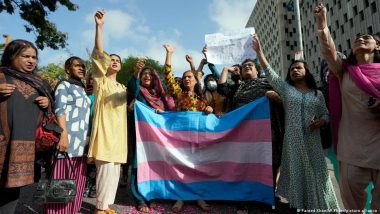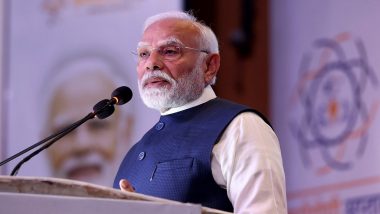Transgender activists in Pakistan plan to appeal to the highest court against an Islamic court that overturned the country's 2018 laws protecting transgender rights such as legal gender recognition.Transgender activists in Pakistan said on Saturday they plan to to launch a Supreme Court challenge against a ruling by Pakistan's religious judiciary, which deemed various transgender legal protections un-Islamic and therefore void.
Also Read | Shark Attack in Florida Keys, Bites Fisherman Who Had Reeled It In, Sending Man to Hospital.
On Friday, the Federal Shariat Court — which determines whether laws accord to Islam — struck down three sections of a 2018 act hailed for providing landmark rights to the transgender community.
Also Read | Why the Dollar’s Dominance is Declining in the Middle East.
The Transgender Persons (Protection of Rights) Act was passed by Parliament in 2018 to secure the rights of transgender Pakistanis. It ensures their access to legal gender recognition, among other rights.
The 2018 rules were strikingly moderate for the Islamic country, considering that Pakistan also does not recognize same-sex marriage, and outlaws sex between men with the possibility of prison terms, among other restrictions.
What did the Sharia court decide?
The Federal Shariat Court struck down several provisions of the landmark law, terming them "un-Islamic." It ruled that a person cannot change their gender on the basis of "innermost feeling" or "self-perceived identity" and must conform to the biological sex assigned to them at birth.
It rejected a clause in the law in which the country's national database and registration authority permits the change of a person's biological gender from the one they were assigned at birth in identification documents including drivers' licenses and passports.
The court also ruled that the term "transgender" as it is used in the law creates confusion. It covers several biological variations, including intersex, transgender men, transgender women and Khawaja Sira, a Pakistani term commonly used for those who were born male but identify as female.
The judges said a section of the 2018 act outlawing transgender discrimination risks "the right to privacy of females in our society".
"This law will pave the way for criminals in society to easily commit crimes like sexual molestation, sexual assault and even rape against females," the finding said.
However, the court said Islamic law recognizes the existence of intersex people and eunuchs and said they should be entitled to all the fundamental rights provided to Pakistanis in the constitution.
What was the reaction?
The Human Rights Commission of Pakistan expressed dismay over the "regressive ruling" and said the denial of transgender people's rights to self-perceived gender identity seeks the "erasure of an entire demographic and its fundamental rights."
It said rolling back the transgender bill would lead to further marginalization and abuse of an already vulnerable community in Pakistan.
Amnesty International called on the government to stop any attempts to prevent transgender people from obtaining official documents reflecting their gender identity without complying with abusive and invasive requirements.
"This verdict is a blow to the rights of the already beleaguered group of transgender and gender-diverse people in Pakistan," said Rehab Mahamoor, research assistant at Amnesty International, in a statement.
Violence against transgender people in Pakistan
"This decision will further increase the incidents of violence against transgender people," said Shahzadi Rai, of the Gender Interactive Alliance and Sindh province's trans pride Moorat March organisation.
"Transgender people will be pushed further against the wall in society," Rai said in a statement after the Supreme Court legal challenge was announced at Karachi Press Club.
Many Pakistanis have entrenched beliefs on gender and sexuality and transgender people are often considered outcasts. Some are forced into begging, dancing and even prostitution to earn money. They also live in fear of attacks.
The Human Rights Commission of Pakistan said 19 trans people were murdered in Pakistan last year and accused the state of getting "cold feet" over community protections.
dh/msh (AP, AFP)
(The above story first appeared on LatestLY on May 21, 2023 01:10 AM IST. For more news and updates on politics, world, sports, entertainment and lifestyle, log on to our website latestly.com).













 Quickly
Quickly




















